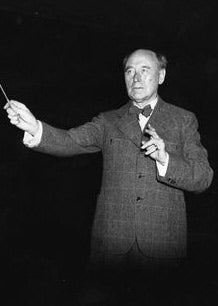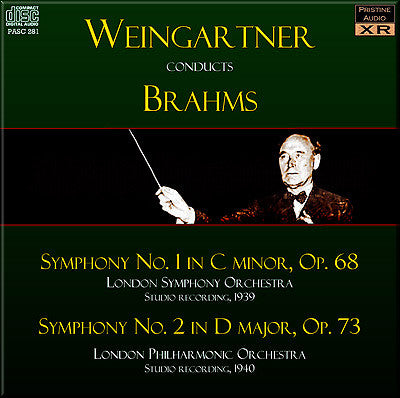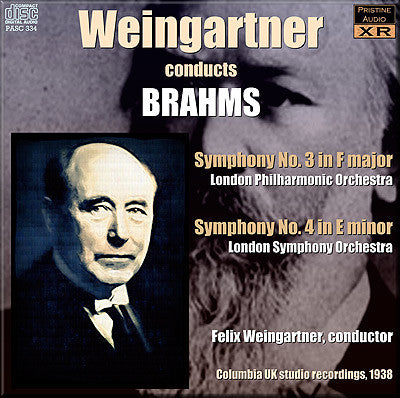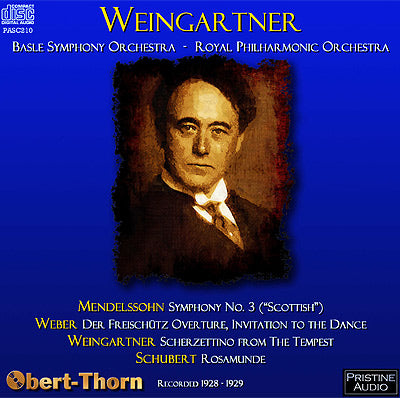Felix Weingartner

Paul Felix Weingartner, Edler von Münzberg (2 June 1863 – 7 May 1942) was an Austrian conductor, composer and pianist.
Weingartner was born in Zara, Dalmatia, Austria–Hungary (now Zadar, Croatia), to Austrian parents. The family moved to Graz in 1868, and his father died later that year. He studied with Wilhelm Mayer (who published his own compositions under the pseudonym of W. A. Rémy and also taught Ferruccio Busoni). In 1881 he went to Leipzig to study philosophy, but soon devoted himself entirely to music, entering the Conservatory in 1883 and studying in Weimar as one of Franz Liszt's last pupils. Liszt helped produce the world premiere of Weingartner's opera Sakuntala in 1884 with the Weimar orchestra. According to Liszt biographer Alan Walker, however, the Weimar orchestra of the 1880s was far from its peak of a few decades earlier and the performance ended up poorly, with the orchestra going one way and the chorus another. Walker got this account from Weingartner's autobiography, published in Zürich and Leipzig in 1928-1929. The same year, 1884, he assumed the directorship of the Königsberg Opera. From 1885 to 1887 he was Kapellmeister in Danzig, then in Hamburg until 1889, and in Mannheim until 1891. Starting that year, he was Kapellmeister of the Royal Opera and conductor of symphony concerts in Berlin. He eventually resigned from the opera post while continuing to conduct the symphony concerts, and then settled in Munich, where he incurred the enmity of pundits like Rudolf Louis and Ludwig Thuille.
In 1902, at the Mainz Festival, Weingartner conducted all nine Beethoven symphonies. From 1907 to 1910 he was the Director of the Vienna Hofoper, succeeding Gustav Mahler; he retained the conductorship of the Vienna Philharmonic until 1927. From 1912 he was again Kapellmeister in Hamburg, but resigned in 1914 and went to Darmstadt as general music director while also often conducting in the U.S. for the Boston Opera Company between 1912-1914. In 1919-20, he was chief conductor of the Vienna Volksoper. In 1920, he became a professor at the Franz Liszt Academy in Budapest. From 1927 to 1934 he was music director of the Basel symphony orchestra. He made many outstanding Beethoven and Brahms symphony recordings in Vienna and London between the mid-1920s and his last recording session with the London Symphony, including an electrifying Brahms Second to complete the historic Beethoven-Brahms symphony cycle he began in the 1920s (see below), on February 29, 1940. He gave his last concert in London that year and died in Winterthur, Switzerland two years later.
Weingartner was the first conductor to make commercial recordings of all nine Beethoven symphonies, and the second (to Leopold Stokowski in Philadelphia) to record all four Brahms symphonies. In 1935 he conducted the world premiere of Georges Bizet's long-lost Symphony in C. His crisp classical conducting style contrasted with the romantic approach of many of his contemporaries such as Wilhelm Furtwängler, whose conducting is now considered "subjective" on the basis of tempo fluctuations not called for in the printed scores; while Weingartner was more like Arturo Toscanini in insisting on playing as written. His 1935 recording of Beethoven's Symphony No. 9, for instance, sounds much more like Toscanini's 1936, 1938, 1939 and 1952 renditions (only the last of which was recorded in a studio rather than at a concert) than Furtwängler's far more expansive readings.
He taught conducting to students as eminent as Paul Sacher, Charles Houdret, Georg Tintner and Josef Krips. He experimented with films of himself conducting (such as in his only recorded performance of Weber's overture to Der Freischütz) as a tool in "orchestral training".

Felix Weingartner
Paul Felix Weingartner, Edler von Münzberg (2 June 1863 – 7 May 1942) was an Austrian conductor, composer and pianist.
Weingartner was born in Zara, Dalmatia, Austria–Hungary (now Zadar, Croatia), to Austrian parents. The family moved to Graz in 1868, and his father died later that year. He studied with Wilhelm Mayer (who published his own compositions under the pseudonym of W. A. Rémy and also taught Ferruccio Busoni). In 1881 he we...
BRAHMS Symphony No. 1
BRAHMS Symphony No. 2
Recorded in 1939 and 1940
Total duration: 75:43
London Symphony Orchestra
London Philharmonic Orchestra
conductor Felix Weingartner
BRAHMS Symphony No. 3
BRAHMS Symphony No. 4
Recorded in 1938
Total duration: 67:28
London Philharmonic Orchestra
London Symphony Orchestra
conductor Felix Weingartner
WEBER Der Freischütz - Overture
SCHUBERT Rosamunde, D797 - Entr'acte No. 3
WEINGARTNER The Tempest - Scherzettino
WEBER Invitation to the Dance
MENDELSSOHN Symphony 3
Recorded 1928 and 1929
Total duration: 58:41
Basle Symphony Orchestra
Royal Philharmonic Orchestra
Felix Weingartner, conductor
- Previous
- Page 2 of 2
-
Next



